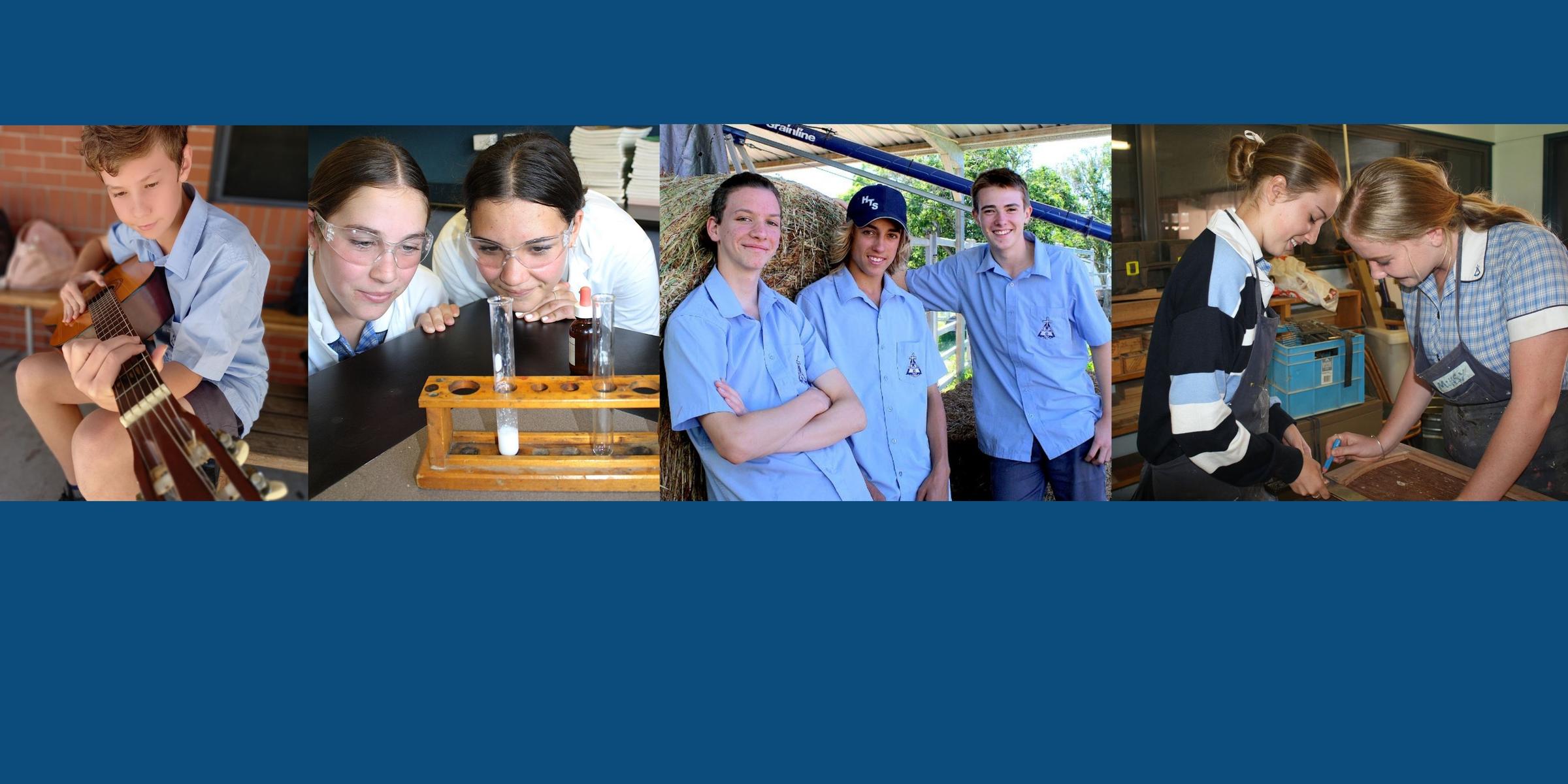SECONDARY NEWS
From the Assistant Principal
Miss Kim Bailey
kbailey@arm.catholic.edu.au

SECONDARY NEWS
From the Assistant Principal
Miss Kim Bailey
kbailey@arm.catholic.edu.au
To the Holy Trinity Show Team who will compete at the Glen Innes Steer Show on Friday.
As part of the transition process a Family Information Session will be held tomorrow, Wednesday 6 September. There will be a tour at 5.00pm followed by an Information Session in the Library at 5.30 pm. During the last week of term, the Year 6 students will again be visiting for ‘A Day in the Secondary’ when they will get the chance to have some of their lessons in Secondary classrooms as well as getting the experience of moving to various locations throughout the school for their classes.
With the arrival of Spring students are able to wear their summer uniform. We remind students to wear either summer or winter uniform, not a mixture of both. It is also advisable to check the forecast as early Spring weather is often a time with great temperature fluctuations. The lost property bin in the Secondary staffroom has a number of jackets and other items of clothing.




Congratulations to the cast and crew of Matilda for what was an excellent production. There were also many staff and students working hard behind the scenes and we extend a huge thank you to everyone involved. A particular thank you must go to the Director Mrs Marshall whose hard work and commitment who oversaw the entire production from the beginning.
Parents are able to pay for the upcoming excursions via the Compass Portal.
- Year 9 Sydney Excursion - $670
- Year 8 Tea Gardens Excursion - $450
If financial assistance is required, please contact Mrs Rainger as soon as possible. Consent forms for various activities may still need to be signed and returned for excursions.
Dream Cricket was initiated by Dr Roly Bigg of the Movement Disorder Foundation in concert with the Rotary Clubs of the Southern Highlands and the Bradman Foundation. The aim was to provide primary school students with special needs an opportunity to play cricket activities on Bradman Oval. The Dream Cricket program has grown to encompass schools and children throughout Australia and internationally. Thank you to our Year 9 & 10 students who assisted with the Dream Cricket which was hosted by Holy Trinity on Tuesday.
Remember to accept the invitation to sign up for Google Classroom Guardian Summaries. Please contact Miss Bailey if you have any questions or problems.


It can be difficult to stay positive at all times about your schoolwork, particularly if you have challenges, whether they be personal or when you are grappling with something like online learning. When we allow pressure and stress to build, we can get into bad habits and let go of good habits. As a result, students can feel even more drained and exhausted. The key to being positive and managing negative emotions such as anxiety and feeling down and depressed in any pressure situation, including schoolwork and exams, is to “fuel up”. “Fuelling Up” is about boosting wellbeing factors in your life. You need to boost the wellbeing factors in your
BODY, MIND and EMOTIONS.
BODY: Here are some things you can do to boost the energy in your BODY
Get better sleep
Feeling good all starts with getting the right amount and type of sleep. Start with a good night-time routine. Stop anything that stimulates you, such as caffeine or TV or computer,iPad or phone screens etc. Try a warm drink such as chamomile tea and use essential oils such as lavender oil. Having a soothing bath or shower can also help along with gentle stretching of tight or tense muscles. If you still feel you are not getting a “good” sleep, besure to see your doctor.
Eat in Moderation
Never skip a meal, especially breakfast. Breakfast replenishes your body and helps you start your day full of energy. Eat three main meals and two to three snack meals a day.Eating five to six times a day keeps your blood sugar levels balanced, giving you an overall sense of well-being needed for focusing on your tasks and responsibilities.
Exercise Regularly
Regular exercise, at least three times per week for a minimum of 30-minute sessions, can virtually “soak up” stress chemicals in your body and help you to relax and even sleep better. Brisk walking, aerobic classes, swimming, bike riding, or jogging are great exercises to release stress buildup and relax your body and mind to either start or end your day right.
MIND: Here are some things you can do to THINK more positive
Change your thinking and perceptions
Write down your top 5 fears and worries. What’s the worst thing that can happen? Then ask yourself, “IS THAT TRUE”? Usually, fears and worries are not based on reality buton imagined scenarios that have little to no evidence. If it’s something that can’t be changed, bring acceptance to it. It is what it is for now!
Change your focus
Have you noticed that what we worry about, we make bigger and keep closer to us by the way we think and focus? Try this…make your fears and worries SMALL in size (5 cm in height), DARK in brightness and as far away as possible in DISTANCE. When we change the size, brightness and distance of the things that upset us in our minds, it reduces the intensity of the emotion.
EMOTIONS: Here are some things you can do to FEEL more positive
Acts of kindness
Make a list of 5 acts of kindness you can do every day. Make them simple acts of kindness that are easy to do, such as saying thank you etc. Do these 5 acts of kindness every day for 6 weeks. The research shows that people that do this and think of 3 good things in their life (as above) have a dramatic positive boost in their mood.
3 good things exercise
Every day at the start and end of your day, think of 3 good things that happened. Write them down. Then think about either WHY those good things happened or how it MADE YOU FEEL when those good things happened.
Start ticking things off your list
Pick something small and achievable to start with that you need to do for school and get it done. You will feel much more positive when you start doing things. Do a few more easy things to get your confidence up, then tackle a more challenging task.
GETTING MOTIVATED TO DO YOUR WORK
Learning Collaboratively
We are all different in the way we prefer to learn. Some students like to work in groups, and others prefer to work alone. Some students like to discuss things over Skype or messenger and some like to work together in person. There is a reason why we have the saying ‘two heads are better than one’, so let’s see how this applies to different types of students.
If you think you always prefer to work alone:
- It is great that you are very self-sufficient. Students who prefer to work alone are often confident in their own abilities. However sometimes these students make it more difficult for themselves by not asking for help when they need it. So if you are this type of student, don’t struggle on alone when you get into difficulties or don’t understand something. Being able to ask for help when you need it is an important skill for academic success. Just become more aware that you don’t always ask for help and instead try reaching out a little more when you need help.
- The other area to consider is that when you talk about things with other people it can
often help you to see things from a different perspective. By discussing ideas with another person, you also may find you clarify your own thoughts. By not being open to collaboration, you might not develop your ideas as well as you could or you might not see potential issues that a fresh pair of eyes and ears might discover. If you haven’t done much collaboration, give it a try and you might find yourself surprised at how valuable you find the experience.
If you already love working with other people:
- Make sure that you always contribute equally and don’t expect other people to do all the work for you.
- Collaboration doesn’t mean cheating. For example, it is ok to discuss an assignment and what you think it is about and how you might approach it, but it is not ok to write the assignment together and hand in similar pieces of work.
- Collaboration also doesn’t mean wasting time. If you are working with other people make sure you are staying on task and not getting distracted.
- Every now and then you have to do things on your own. If you always do your Maths homework with your friends, you might not really know what you can and can’t do on your own. The first time you find this out could be a test which could be a big issue. Always ask yourself if the work you are doing is going to be enhanced by collaboration or if it is more appropriate to try the work on your own.
- It is important each night to have a certain amount of homework time on your own. If you want to collaborate when you are working at home, make specific times to do this. Don’t Skype the entire night with your friends. Instead have set times for collaboration and set times for independent work.
Miss Kim Bailey
Miss Claudia Cush
Mrs Angela East
Mr Peter Ehsman
Mr Anthony Gaias
Miss Alana Goldman
Mrs Mary-Jane Guest
Mrs Lee Grady
Mrs Malynda Hiscock
Mr David Koch
Mrs Stephanie Marshall
smarshall3@arm.catholic.edu.au
Mrs Veronica McCormick
Mrs Christine McLachlan
cmclachlan@arm.catholic.edu.au
Mr Matthew Pye
Mrs Jane Taylor
Mrs Katherine Townsend
Mr Blake Uebergang
Mrs Carrie Watchirs